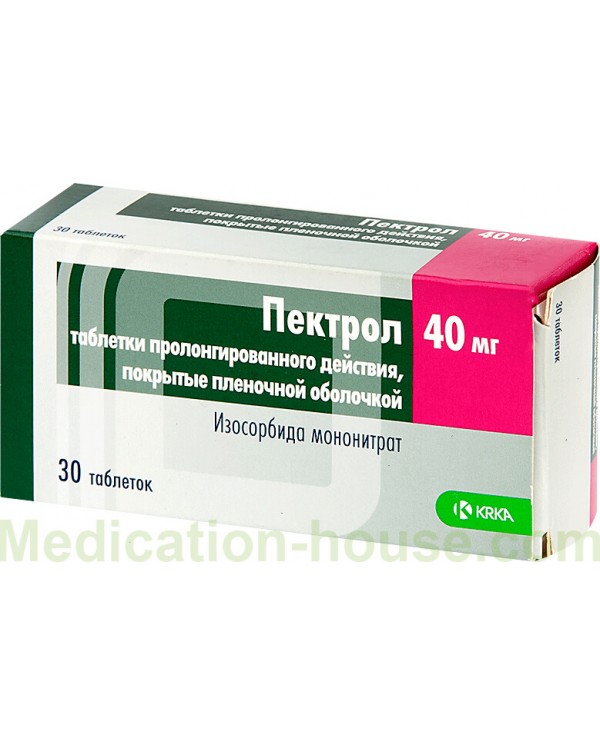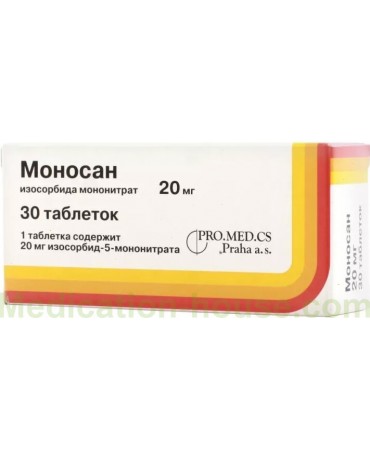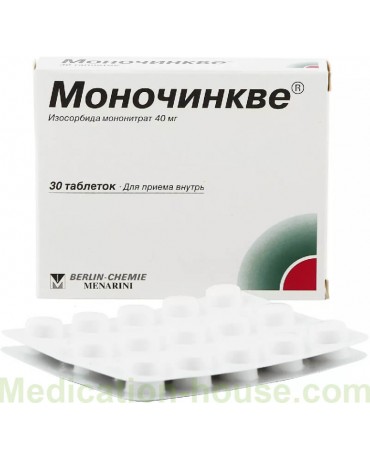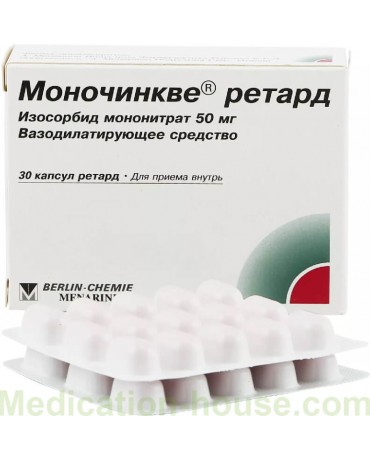Instruction for Pectrol
You can buy Pectrol on this page
Pectrol is a peripheral vasodilator, antianginal agent.
Release form and composition
Dosage form - tablets of prolonged action, film-coated (10 pcs. In blisters, 3 or 10 blisters in a cardboard box):
40 mg: round, slightly biconvex, white with a yellowish tinge of color (possibly inclusions), engraved with "IM40" on one side;
60 mg: oval, slightly biconvex, white with a yellowish tinge of color (possibly inclusions), engraved with "60" on one side and a line on both sides.
Composition of 1 tablet:
Active ingredient: isosorbide mononitrate - 40 or 60 mg;
Auxiliary components: carnauba wax, magnesium stearate, purified stearic acid, hypromellose, colloidal silicon dioxide, lactose monohydrate;
Film shell: talc, titanium dioxide, magnesium stearate, iron dye yellow oxide (E172), as well as hypromellose (60 mg tablets).
Pharmacodynamics
Pectrol is a peripheral vasodilator that predominantly affects the venous vessels.
Its mechanism of action is as follows: the active substance of the drug (isosorbide mononitrate) stimulates the formation of nitric oxide in vascular endothelial cells; nitric oxide activates intracellular guanylate cyclase, resulting in an increase in the amount of cGMP (cyclic guanosine monophosphate), which is a mediator of vasodilation. When the smooth muscles of the walls of blood vessels relax, the venous return to the heart decreases, the load on the heart decreases, which ultimately leads to a decrease in the oxygen demand of the heart muscle. The dilating effect of nitrates on arterioles and arteries reduces afterload (ejection resistance). There is a coronary dilating effect, the blood flow to the right atrium decreases, the pressure in the pulmonary circulation decreases, the symptoms of pulmonary edema disappear.
Isosorbide mononitrate promotes the redistribution of blood circulation through the blood vessels of the myocardium in the area with reduced blood circulation. Patients with angina pectoris and coronary artery disease have increased exercise tolerance. The drug dilates the blood vessels in the dura mater and the brain, which can lead to headaches. Pectrol inhibits platelet aggregation and reduces thromboxane synthesis in platelets.
Cross-tolerance may develop during treatment, as with other nitrates. After a break in therapy, sensitivity to the drug quickly recovers.
The antianginal effect develops within 30-40 minutes after taking the pills and lasts for 8-10 hours.
Pharmacokinetics
Pectrol is rapidly and completely absorbed from the digestive tract. The bioavailability of isosorbide mononitrate is almost 100%, since there is no "first pass" effect through the liver. Food intake, pH in the intestinal lumen or intestinal motility do not affect the release of the active substance from the tablets.
The drug is distributed in the general body fluid. About 5% of isosorbide mononitrate binds to plasma proteins. The effective concentration of the drug is 100 ng / ml and is reached 30 minutes after ingestion.
It is metabolized by conjugation with glucuronic acid and denitrization. The excretion of the inactive metabolite occurs through the kidneys. Renal clearance is 115 ml / min, and the elimination half-life is 4-10 hours.
In patients with renal and hepatic insufficiency, the pharmacokinetics of the drug does not change significantly.
Indications for use
Treatment of chronic heart failure (as part of combination therapy);
Prevention of angina attacks in patients with coronary artery disease (IHD).
Contraindications
Absolute:
Acute heart failure;
Cardiac tamponade;
Acute myocardial infarction with severe arterial hypotension;
Arterial hypotension and hypovolemia (diastolic blood pressure below 60 mm Hg, systolic blood pressure less than 100 mm Hg, central venous pressure below 4-5 mm Hg);
Left ventricular failure with low end-diastolic pressure;
Vascular collapse;
Shock;
Diseases and conditions accompanied by increased intracranial pressure (including hemorrhagic stroke, consequences of traumatic brain injury);
Toxic pulmonary edema;
Age under 18;
Hypersensitivity to any component of the drug or nitrates.
Relative (Pectrol should be taken with caution due to the increased risk of side effects):
Mitral valve prolapse;
Mitral and / or aortic stenosis;
Tendency to orthostatic disorders of vascular regulation;
Constrictive pericarditis;
Hypertrophic cardiomyopathy;
Thyrotoxicosis;
Severe anemia;
Severe hepatic / renal impairment;
Elderly age.
Instructions for the use of Pectrol
The tablets should be taken orally after meals: swallow whole and drink plenty of water (1 glass).
Specific doses and frequency of administrations depend on the severity of the disease and are determined individually by the doctor.
The recommended starting dose is 40 mg once a day (in the morning). For patients who have nocturnal attacks of angina pectoris, it is preferable to take the drug in the evening. If the severity of the effect of the drug is not enough, from the 3-5th day of treatment, the dose is increased to 60 mg 1 time per day or 40 mg 2 times a day.
In chronic heart failure, therapy is usually started in a hospital and carried out until the optimal maintenance dose is selected, taking into account the clinical effect and side effects.
For maintenance treatment, usually 40 or 60 mg 1 time per day or 40 mg 2 times a day is prescribed. In the latter case, the first pill should be taken in the morning, and the second after about 7 hours. In this case, the interval between evening and morning receptions should not be less than 12 hours.
Side effects
Dermatological reactions: skin rash; in individual cases - exfoliative dermatitis;
From the side of the cardiovascular system: a marked decrease in blood pressure, transient hyperemia of the facial skin, tachycardia, a feeling of heat, nitrate headache, vertigo; rarely - a paradoxical reaction (increased angina attacks), orthostatic collapse;
From the side of the central nervous system: blurred vision, stiffness, decreased reaction rate (especially at the beginning of treatment), drowsiness; rarely - cerebral ischemia;
From the digestive system: a slight burning sensation of the tongue, nausea, dry mouth, vomiting;
Others: tolerance (including cross-tolerance to other nitrates).
Overdose
In case of an overdose, the following symptoms occur: dizziness, headache, vomiting, nausea, diarrhea, bradycardia, palpitations, dyspnea, hyperpnea, skin hyperemia, methemoglobinemia, visual disturbances, hyperthermia, increased intracranial pressure, fainting, sweating, collapses, and paralysis ...
In case of accidental or deliberate overdose of the drug, gastric lavage is performed. With a strong decrease in blood pressure, phenylephrine is prescribed intravenously, with methemoglobinemia - 1 g of ascorbic acid (intravenously or orally) and 1% solution of methylene blue at a dose of 1-2 mg / kg of body weight intravenously. The use of epinephrine and related compounds is ineffective.
Special instructions
Pectrol is a drug for the prevention of angina attacks; it is not used for their relief.
Correct use of the drug prevents the development of nitrate tolerance. It is very important to strictly adhere to the dosage regimen and the 12-hour interval between evening and morning doses. In this case, it is possible to achieve a period with a low concentration of nitrates (less than 100 ng / l) while maintaining the therapeutic effect.
Pectrol should not be canceled abruptly; the dose must be gradually reduced.
Blood pressure and heart rate should be kept under control during treatment.
When transferring a patient from isosorbide dinitrate to Pectrol, the total daily dose must be calculated in advance, taking into account that 20 mg of isosorbide dinitrate corresponds to 10 mg of isosorbide-5-mononitrate.
Since the drug can affect the rate of psychophysical reactions, during treatment, you should drive a car with caution and perform potentially hazardous activities.
Application during pregnancy and lactation
For pregnant women, Pectrol is prescribed only in cases where the expected benefit to the mother is higher than the potential risk to the fetus.
If it is necessary to use the drug during breastfeeding, breastfeeding should be discontinued.
Childhood use
According to the instructions, Pectrol is not used in children and adolescents under the age of 18, since there are no data on the safety and efficacy of using the drug in this group of patients.
With impaired renal function
In patients with severe renal failure, the drug is used with caution.
For violations of liver function
In patients with hepatic insufficiency, the drug is used with caution (due to the risk of developing methemoglobinemia).
Use in the elderly
In elderly patients, the drug is used with caution.
Drug interactions
Barbiturates accelerate the biotransformation of isosorbide mononitrate and reduce its concentration in the blood.
In the case of simultaneous use, Pectrol increases the concentration of dihydroergotamine in the blood.
An increase in the antihypertensive effect is possible with the simultaneous use of vasodilators, beta-blockers, slow calcium channel blockers, tricyclic antidepressants, antipsychotics, ethanol, novocainamide, quinidine, dihydroergotamine, sildenafil.
An increase in the antianginal effect is possible with the simultaneous use of acetylsalicylic acid, slow calcium channel blockers (for example, nifedipine or verapamil), propranolol, amiodarone.
When used in combination with alpha-blockers (including dihydroergotamine) or beta-adrenostimulants, the severity of the antianginal effect may decrease, which is manifested by an excessive decrease in blood pressure and tachycardia.
Absorbent, enveloping and astringent preparations reduce the absorption of isosorbide mononitrate in the gastrointestinal tract.
M-anticholinergics (including atropine) increase the risk of increased intraocular pressure.
Terms and conditions of storage
Store at temperatures up to 25 ° C out of reach of children.
Shelf life is 3 years.
Reviews about Pectrol
Reviews about Pectrol are few. Patients note the appearance of headache and sedation at the beginning of treatment, as well as an increase in heart rate up to 120 beats per minute and surges in blood pressure. Despite this, the drug is effective when used according to indications.
Terms of sell
You can buy Pectrol without a prescription.




